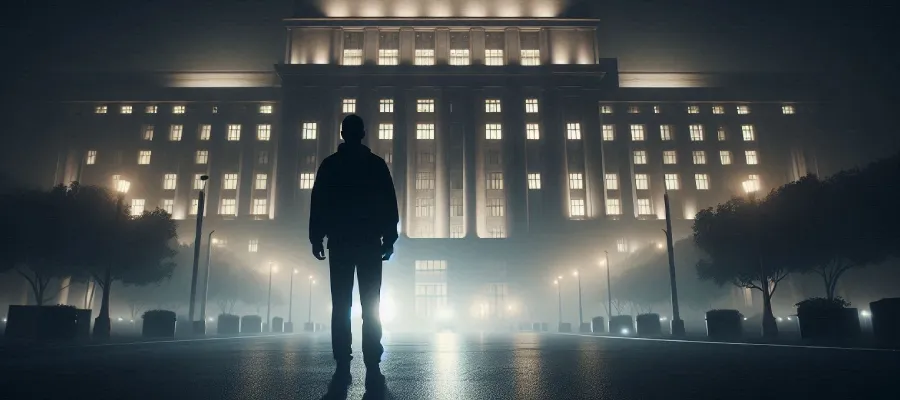Government Secrecy Is Easier, Not Harder
When someone insists, “There’s no way the government could keep something like that a secret,” regardless of what “that” might be, they are making a claim that simply collapses under even the slightest scrutiny. To believe such nonsense is to ignore both distant and recent history… and logic. Government secrecy is not only a very real thing, but their ability to hide things from you might be easier than ever before.
Do we want to be right, or do we want to be accurate? Let’s begin with the obvious. There is a well-documented history of secret (and often detrimental) government programs, some of which remained classified for decades before being exposed. Consider a few examples:
- The Manhattan Project successfully developed the first nuclear weapons in complete secrecy despite involving over 130,000 people across multiple sites.
- MKUltra, a covert program of human experimentation on U.S. citizens without their consent, was only revealed through congressional investigations decades later.
- The Tuskegee Syphilis Study, where the government observed, rather than treated, Black men suffering from syphilis for forty years under the guise of medical research.
- Operation Northwoods, a declassified plan proposing false-flag attacks on American soil to justify military action against Cuba.
- The secret construction of entire towns, such as Oak Ridge and Los Alamos – built to facilitate nuclear research. For that matter, even their inhabitants remained largely unaware of the true purpose of their work.
- The NSA’s mass surveillance programs were only exposed to the public through the revelations of Edward Snowden despite years of operation and extensive secrecy.
- Or, how about Area 51, Stealth Technology, The Pentagon Papers (1971), COINTELPRO, U-2 Spy Planes and the Cold War, The SR-71 Blackbird, The Iran-Contra Affair, The Stuxnet Virus, Etc… Etc… Etc.
The existence of these programs is irrefutable. They were real, they were hidden, and they were only uncovered long after their inception. Sadly, the total list is considerably longer, but I’m just trying to make a point. How many examples are necessary before a misconception can finally die?
Now, some may argue that times are different and that today is different because we live in the Information Age, suggesting that secrecy is more difficult to maintain due to the internet, artificial intelligence, and widespread digital communication. While that might feel like a valid point, I fundamentally disagree. Frankly, this argument disregards the equally evolved mechanisms of control and disinformation.
In fact, I would argue that while access to information has increased, so has the sophistication of censorship, propaganda, and mass conditioning through astroturfing, media manipulation, and controlled narratives. Moreover, we must understand that we live in an era where people proactively ignore reality to appease their chosen identity. Hence, it might be the easiest time to keep a secret from the American people.
Not that it matters much. Even when harmful truths emerge, they are often disregarded. Take the Snowden revelations, for instance. He exposed vast, unconstitutional surveillance programs, yet the architects of these programs remain unpunished, and mass surveillance continues. The public was given the truth, but systemic inertia, cognitive dissonance, and complacency ensured that little changed. In fact, many red-blooded Americans who value justice even hopped on board the “Anti-Snowden” bandwagon because they were more focused on how he went about sharing those truths rather than the substance of the truths he found. Of course, many things on the previous list were largely ignored or denied when the truth started to come out, too.
Recent Examples of Government Secrecy
While historical examples are useful, we must all understand that secrecy is not a thing of the past. The list of current secrets is considerably shorter – because they are currently kept secrets. Even then, in recent years, numerous revelations have exposed large-scale government deception and collusion:
- Intelligence Agency Overreach: The CIA and FBI have been implicated in extensive surveillance operations targeting not just foreign adversaries but American citizens, political figures, and journalists. Documents continue to surface, revealing the extent of their data collection and manipulation efforts. All of this has been done in secret, and we still don’t know the full depth of the problem.
- Corporate-Government Collusion: Major technology corporations have worked in tandem with government agencies to suppress information, influence public perception, and shape narratives. Social media platforms have been exposed for censoring content under government directives, restricting discussions on controversial topics ranging from public health policies to election integrity. This was all done in secret and was only exposed when people felt safe to say something.
- COVID-19 Origin Cover-ups: Investigations into the origins of COVID-19 have uncovered significant efforts by government agencies and scientific institutions to suppress alternative theories, particularly those related to lab-leak hypotheses. Whistleblower testimonies and declassified documents indicate deliberate obfuscation of critical information that could have altered global responses to the pandemic. We are only now starting to see the truth – well, after the damage has already been done. I suppose the good news is that we now know about something called a “backdated preemptive pardon.”
- Pop-Quiz: Who are the top five record holders for presidential pardons and commutations granted while in office?
- Etc., etc., etc.
How long is this list? We likely won’t know for a while. Frankly, that is the point of this article. The irony is that a lot of attention has been refocused on the “boogieman” that the machine wants you to see. Unfortunately, too many people have taken the bait.
In many ways, this all ties directly into the concept of Epistemic Rigidity, the tendency of people to cling to familiar narratives even when presented with evidence to the contrary. Many refuse to believe that their government (or their political party) would engage in deception because it challenges their worldview and identity and introduces cognitive discomfort. When this information threatens a deeply held belief, many default to motivated reasoning and confirmation bias, dismissing inconvenient truths and going along with their toxic tribe rather than confronting reality. Of course, if these people didn’t allow their emotions to drive their decision-making, they likely could have seen and assumed that it was happening in the first place.
Further, the Adversity Nexus suggests that societies in prolonged comfort and security lose their ability to analyze threats critically. What I want you to understand is that when a population is conditioned into believing that secrecy (or corruption) on a grand scale is implausible, they become significantly easier to manipulate. Without adversity pressing them to challenge authority and question official narratives, they remain docile, allowing deception to persist unchecked. Again, they probably should have anticipated all of this. Oddly enough, and as previously alluded to, the ones who saw it and tried to tell others were simply mocked, ridiculed, ignored, attacked, banished, or jailed.
So, the next time someone claims that the government couldn’t possibly do something wrong or that they couldn’t keep a secret from the American people, consider the evidence and appeal to accuracy. They are deluded. Not only has government secrecy existed, but it continues to this day. The only real question is whether people are willing to acknowledge this reality—or whether they will retreat into the comforting illusion that secrecy or corruption at scale is impossible simply because they don’t want to believe otherwise.
In my view, self-deception is just as damaging as deceiving others. You will never see the light if you choose to close your eyes. Well… perhaps the real reason so many people remain in the dark has less to do with closing their eyes and more to do with the cognitive biases, toxic tribalism, comparative tendencies, and identity attachments that keep them from reaching for the light switch in the first place.
Scary stuff. If you enjoyed this article, you might like, The REAL Problem is the Revolving Door.




